In Booming Grand Rapids, Looking at Equitable Ways to Develop City-Owned Land
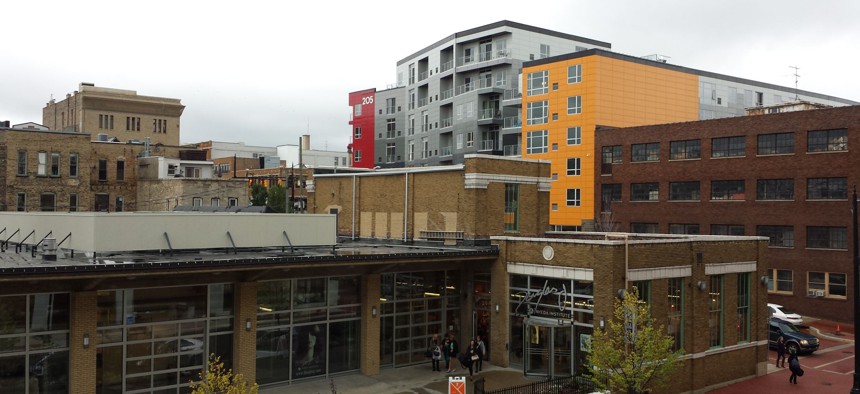
The Heartside District in Grand Rapids, Michigan, has seen major investment and revitalization in recent years. Michael Grass / Route Fifty

Connecting state and local government leaders
As a revitalization success story continues to be written, local leaders want to take a more inclusive approach to new development.
This is third in a series of stories looking at this year’s Daniel Rose Center for Public Leadership 2017 Fellowship cities — Anchorage , Grand Rapids , San José and Washington, D.C. On May 2, Route Fifty , as part of a five-city Roadshow series of events , will be hosting a special Rose Center Mayors’ Forum from the Urban Land Institute ’s Spring Meeting in Seattle. | REGISTER
GRAND RAPIDS, Mich. — Municipal leaders in Michigan’s second largest city are in many ways, just trying to play catch up.
Coming out of the Great Recession, Grand Rapids found itself to be one of the hottest markets in the nation, with new jobs in the health care and technology sectors and a ton of new construction, both in the core downtown as well as in surrounding neighborhoods.
While philanthropic investment in civic institutions continues to be a major force in making Grand Rapids a revitalization success story over the past 25 years, much of the recent development has been financed, at least in part, with economic development incentives such as tax incremental financing and Brownfield redevelopment funds.

Formerly vacant and underutilized commercial and industrial buildings in the historic Heartside District and elsewhere have been converted into condos and apartments. Restaurants, coffee shops, breweries and specialty retail now flourish in a city where businesses once struggled to keep their doors open downtown as the suburbs flourished.
City leaders are quick to applaud the investment from real estate developers, but they also note that amid rising housing costs and a shortage of supply, it’s time to take a more inclusive approach to new development.
That became especially true after listening to the recommendations of the visiting fellows from the Daniel Rose Center for Public Leadership as they discussed the redevelopment opportunities at the 15-acre city-owned riverfront site at 201 Market Ave. SW.
That site is located just south of the U.S. 131 “S Curve,” an elevated expressway separating a revitalized neighborhood anchored by the multi-purpose Van Andel Arena on one side and an area once dominated by light industrial facilities and warehouses.
This part of the city has changed a lot in the past 20 years.
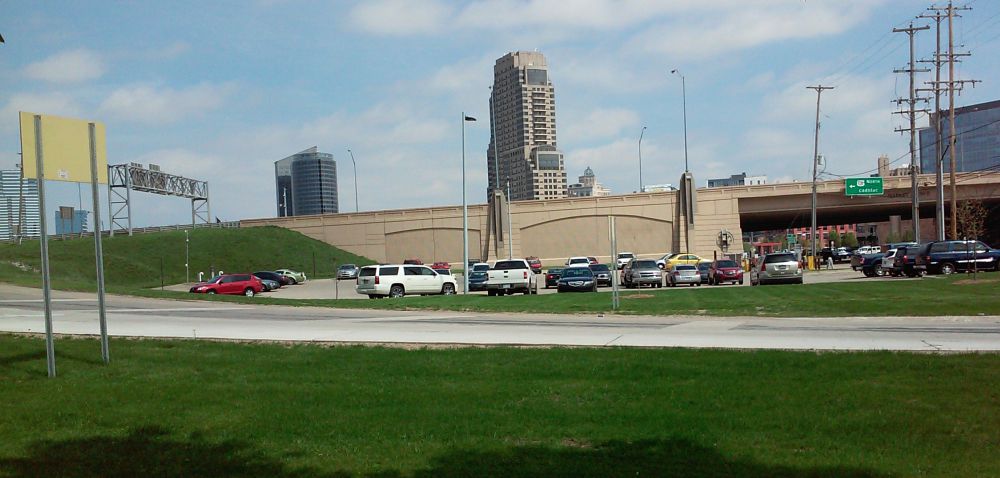
The arena opened in 1996 and in many ways was a catalyst to draw bars, restaurants and clubs to the surrounding blocks, especially Ionia Avenue, which runs south out of downtown on the east side of the expressway.
The S-Curve was rebuilt in the early 2000s and brought street and sidewalk improvements that made surface connections passing under the expressway more inviting. That ultimately helped lay the foundation for the additional revitalization and investments on the south side of the expressway. That included constructing the city’s Central Station transit hub, a new facility for the Grand Rapids Ballet and an expanded home for Founders Brewing Company , one of the nation’s largest craft brewers, which is just a short walk from the 201 Market site.
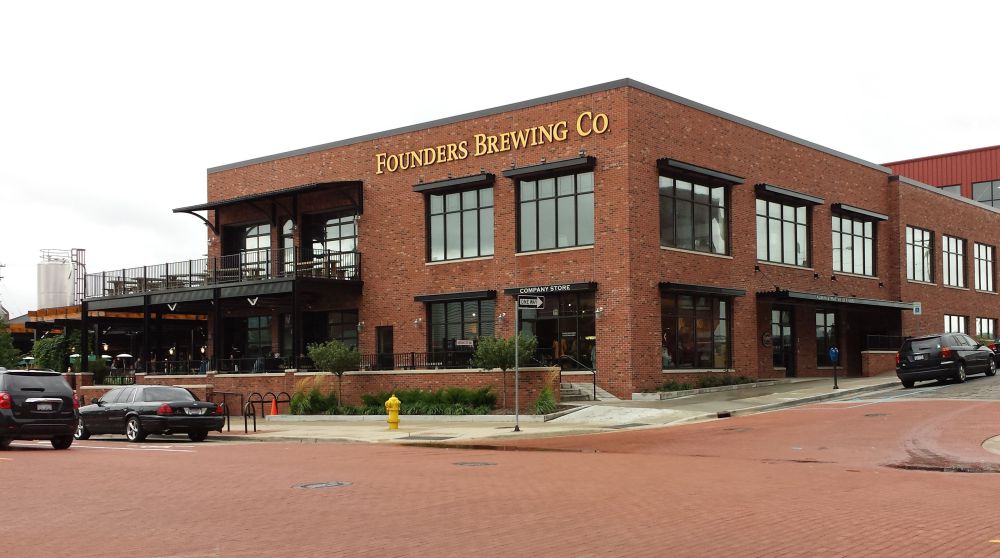
During the same time period, neighborhoods north of the Interstate 196 expressway and west of the Grand River and U.S. 131 began seeing more investment. That included the gradual expansion of the Pew Campus of Grand Valley State University, a major activity center on the west side of the river that’s a relatively quick walk from the 201 Market site.
“Going into looking at the redevelopment of 201 Market, we were already pretty clear that the redevelopment needs to be aligned with our overarching goals as a city, and equity is one of those goals,” Grand Rapids Mayor Rosalynn Bliss told this reporter in an April interview with West Michigan regional business publication MiBiz . “It was part of the discussion even before we put out the RFQ.”
Bliss notes that the city’s site, which has been home to a variety of public works operations and storage, stands as one of a handful of riverfront, publicly-owned properties that the city sees as not living up their highest and best use, adding that Grand Rapids will engage in further discussions with other surrounding municipal bodies about how to best share space and services.
All told, Bliss said that her initial request seeking guidance from the Rose Center was related to how the city could best engage in discussions related to disposing of underutilized municipal properties.
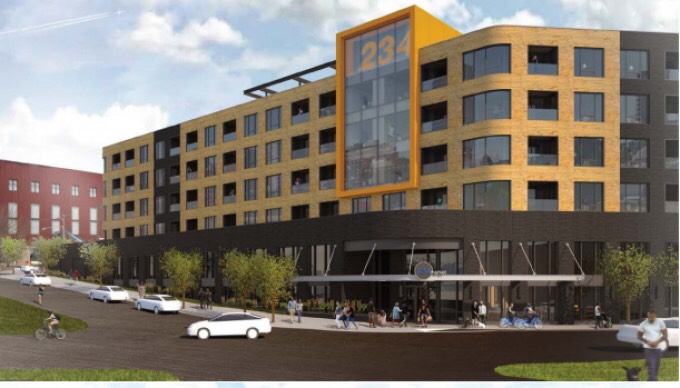
Just across the street from the 201 Market site, developers are in the process of building a $56.5 million mixed-use project that will include more than 230 market-rate apartments along with retail and office space.
There’s a fair bit of reason that city leaders like Bliss and others have begun expressing the need for “equitable” development: Grand Rapids and its housing market has turned into a hotbed for investors, many from out-of-state, and that’s at least in part led to rising housing costs.
Michigan Radio , an NPR affiliate, recently reported that out of the nearly 7,000 single-family homes that went through some sort of foreclosure between 2008 and 2016 in Grand Rapids, 45 percent are now owned by investors.
To be sure—at least in the minds of the city’s leadership—equity means more than just building more affordable housing. And that’s particularly true in the case of the 201 Market site, which is less than a 10-minute walk from the heart of downtown and the Pew Campus of Grand Valley State University on the other side of the Grand River.
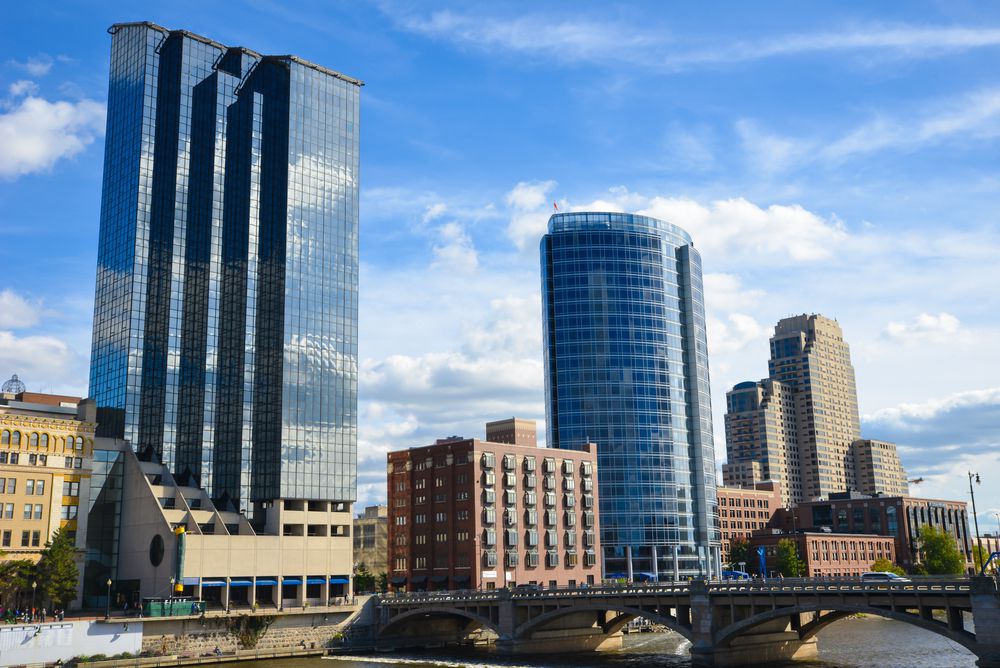
While it’s not clear what yet will get built on the site, municipal leaders believe that the land will also need to offer better connections to public transit as well as access to the Grand River where there’s currently plans underway to restore the historic, eponymous rapids.
“I do think the team from the Rose Center affirmed that when you're redeveloping public property there's an opportunity to be very intentional with how that project is redeveloped,” Bliss said in the MiBiz interview. “And equity needs to be a part of that.”
All told, only one responder out of five to the city’s request for qualifications for 201 Market came from a local developer. City staff say they’ll be evaluating the RFQ responders and likely put out an RFP to qualified developers later this spring or summer.
But while Bliss and other civic boosters know they want to build in greater community equity to whatever deal they carve out for the 201 Market site, it’s also clear there’s not yet a comprehensive definition of just what that means.
“Equity has not been clearly defined if everyone is talking about it,” said Antonio Fiol-Silvia, a Philadelphia architect and one of the visiting Rose Centers fellows, adding that he thinks the city needs to be more effective when it comes to aligning development incentives with equitable land use policies. “There’s limited alignment between city policies, practices and incentives implementation.”
Nick Manes is a journalist based in Grand Rapids, Michigan, and is a regular Route Fifty contributor. Follow him on Twitter @nickrmanes

NEXT STORY: How Cross-Sector Partnerships Are Fueling Innovation in Tampa


